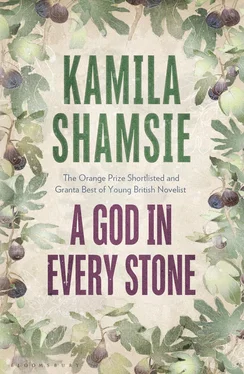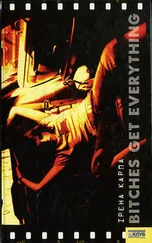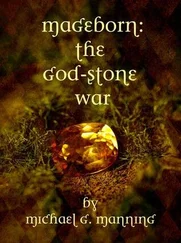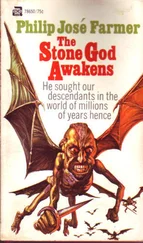Now that reminder strode towards him, beating a walking stick against his own leg, his mouth glistening with apple juice. The rent wasn’t due for weeks but Qayyum didn’t say anything while the rent-collector continued working on the core of the apple, nibbling at the flesh around the seeds.
— Strange rumours around, Qayyum Gul.
— There always are. Which ones have you heard?
— People say you’re using these orchards to train an army for Ghaffar Khan. Of course I reply oh no, he knows the landowner plays polo with the Deputy Commissioner and has a portrait of the King-Emperor in his Peshawar house. He wouldn’t do anything that would force me to come here and tell him these orchards aren’t his to work any longer.
The rent-collector waved his hand expansively around the orchard as he spoke. It was a season of abundance, branches dipping with the weight of their fruit; insects weaved drunkenly between trees, smashing themselves against branches. Qayyum rocked back on his heels, his arms crossed, and nodded to let the rent-collector know he understood.
The rent-collector stayed a few minutes more, talking of weather forecasts and the price of sugar. When he left there was a thud-thud-thud of men-fruit dropping from the trees, and Qayyum knelt on the ground, broke off a piece of turf, and crumbled it in his palm. If this were taken away from him what would his life be — thinned, bounded in. A cloth canopy above his head instead of the branches of an apple tree. The juice of a pen, pale blue, running across his palm where there should be liquid gold, inviting to the tongue. The scratch of a nib and the clamour of salesmen; not the calls of birds, the whisper of leaves. Nothing to compare to that moment when the first fruit of the season, pulled gently, detaches itself from a branch, and rests in your palm. He stood up, faced the men.
— That man came to tell me they will take my land away if I continue to stand here and speak to you. They think they can defeat us with threats. But I will endure what losses I must endure for the sake of freedom. And you? Are you honourable enough to endure, my brothers? For the sake of freedom are you men enough to put down your guns and endure?
— Yes, came the answer, sweeter than apple, more eloquent than ink. Yes!
Najeeb rested a hand on the silver band, its embossed surface. The figures were alternate — one fruit, one leaf, one fruit, one leaf, just as on the Hecatomnid coins. Even uncleaned the delicacy was unexpected, thrilling. In places where the tarnishing wasn’t so extreme he saw veins in the leaves, striations along the fruit. There would have been colour when Darius placed it on Scylax’ head — fig-purple and leaf-green. He spun it. The figs danced, the leaves twirled, Scylax kneeled before Darius and felt its weight settle on him, he dipped it in the Indus with an eye out for crocodiles, placed it on the brow of Heraclides, bloodied from his ambush of the Persians. Najeeb walked his fingertips across the raised surface; a message in Braille, a greeting across the centuries:
Hello, Najeeb!
Hello, Scylax!
Qayyum had never known such clarity of purpose as here, on the front line, facing the soldiers with bayonets at the ready.
He had anticipated none of this when he’d woken to a hammering on his door just after dawn, and one of his neighbours from the Congress Party told him there had been arrests during the night ahead of the proposed anti-English protest strikes scheduled for the day, and people were gathering at the Congress headquarters to decide what to do next. He dressed quickly, woke up Najeeb to say he was leaving, cautioning him to look out for trouble during the day. Najeeb, barely awake, flicked his fingers in the direction of his brother’s glass eye as if it were a marble.
— Goodbye, pacifist girl.
— Goodbye, Englishman’s dog.
— Better an Englishman’s dog than an Englishman’s Indian.
But Qayyum’s thoughts were already elsewhere, and the familiar joke of his own devising echoed strangely. He wondered if there was any point warning Najeeb, once more, about the Englishwoman who was due to arrive by train that day, but the younger man had already returned to sleep, and anyway what could Qayyum say at this point.
He was en route to the Congress offices when he became caught up in the procession. Two leaders of the Congress Party, garlanded with roses, were striding towards the Street of Storytellers, with their party members and allies following behind, calling out the slogan of freedom: Inqilaab Zindabad. What’s going on, Qayyum asked a man in the khaddar uniform of the Congress Party, falling into step beside him. The man looked at Qayyum’s red shirt and belt, nodded as you would to a soldier of another battalion, and said the English had come to the Congress headquarters to arrest the men a little while earlier, but someone — and here the man raised his hands in exaggerated fashion as if to say he had no idea who would do such a thing — punctured the wheels of the lorry brought to transport their leaders to prison. Shocking, Qayyum laughed, shocking vandalism! And the Congressman, trying to look grave, nodded, and said so then the leaders told the police they would present themselves for arrest at the police-thana at Kabuli Gate — and here they all were, on their way, showing the English that you can arrest two men or ten but hundreds more will follow behind and demand liberty.
But when they arrived at the police-thana the doors were closed — the policemen thought the crowd was there to storm the station. Qayyum, tall enough to see above the heads of almost everyone else present, smiled at the unfolding spectacle: Congress leaders pleading with the police, insisting they were there to be imprisoned; policemen refusing to let them in. And the crowd, larger in size now, entirely peaceful, urging the police to arrest their leaders between cries of Inqilaab Zindabad. It would be enough to make any Englishman’s head spin. Finally, finally, the doors opened; the Congress leaders entered to great whoops of support from the men outside. Someone threw a handful of petals at them as if they were brides entering their marital home for the first time.
— That was fun.
Qayyum nodded in agreement with the Congresswalla standing next to him, when he saw the face of one of the Indian policemen behind the gates — terrified, blood-drained. Of course, every policeman must be thinking of Chauri Chaura, eight years earlier, when a clash between police and Congress volunteers during the first Non-Cooperation Movement led to the deaths of twenty-six civilians and twenty-one policemen, the policemen all burnt alive in their thana.
You live in your history, we live in ours. The thought made him tired, unwilling to join the group of Khudai Khidmatgar who were dancing in a circle near the jail door, and he had turned to walk away when he heard a sound which didn’t make sense and looked up to see armoured cars driving through Kabuli Gate.
After that the morning spooled dramatically away from anything that was predictable — accelerating cars, men crushed beneath wheels, machine guns, fire, screams of death and slogans of freedom, bullets and stones. The Street of Storytellers turned into a battleground with the troops on one side and freedom fighters on the other. One round of bullets, one round of deaths, then a pause, negotiations — first you withdraw, no, first you withdraw — and the numbers on the Street of Storytellers grew. Not just the red-shirted Khudai Khidmatgar and their Congress and Khilafat allies but other men of Peshawar who had heard what was happening and came to witness, came to cry out Inqilaab Zindabad. Soon the street was crowded. From the balconies and roofs of buildings spectators watched, some threw stones; on the ground the King’s forces — on foot, on horse, in armoured cars, all armed with rifles and bayonets and machine guns — occupied the space between Kabuli Gate and Dakhi Nalbandi. Beyond that, hundreds of Peshawaris planted their feet on the Street of Storytellers and said no, they would not retreat. If a man is to die defending a land let the land be his land, the people his people.
Читать дальше












